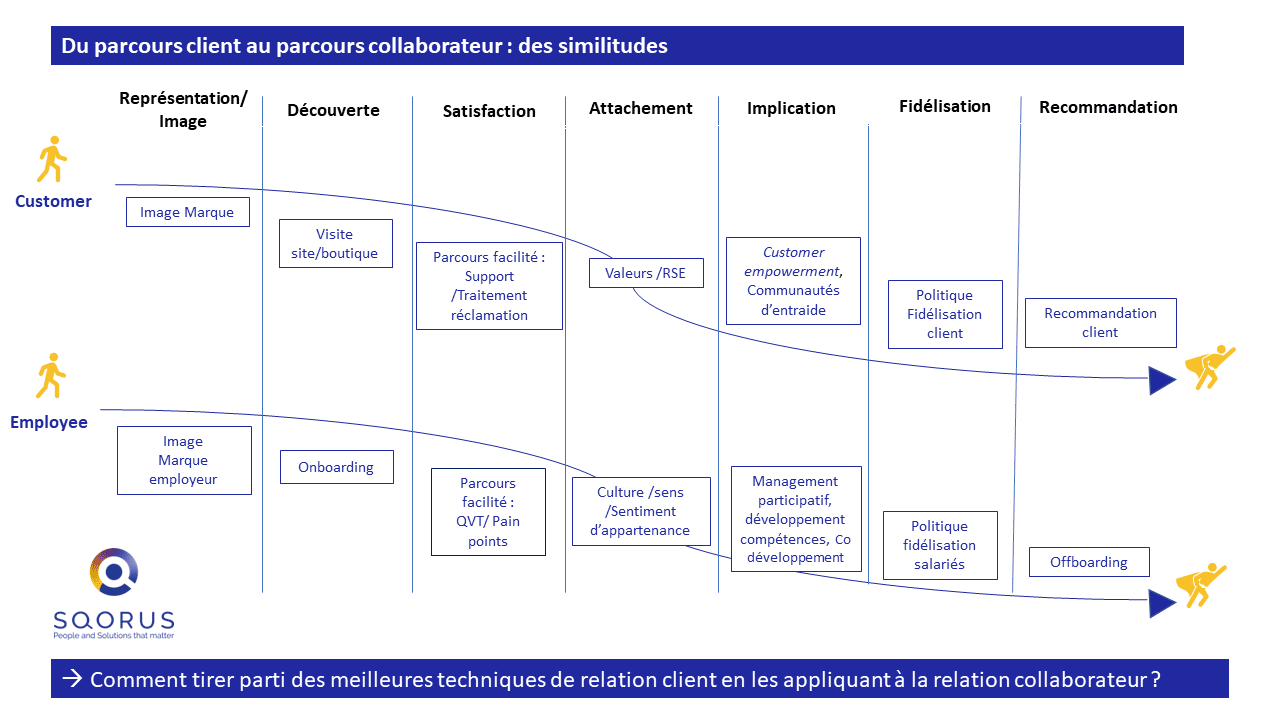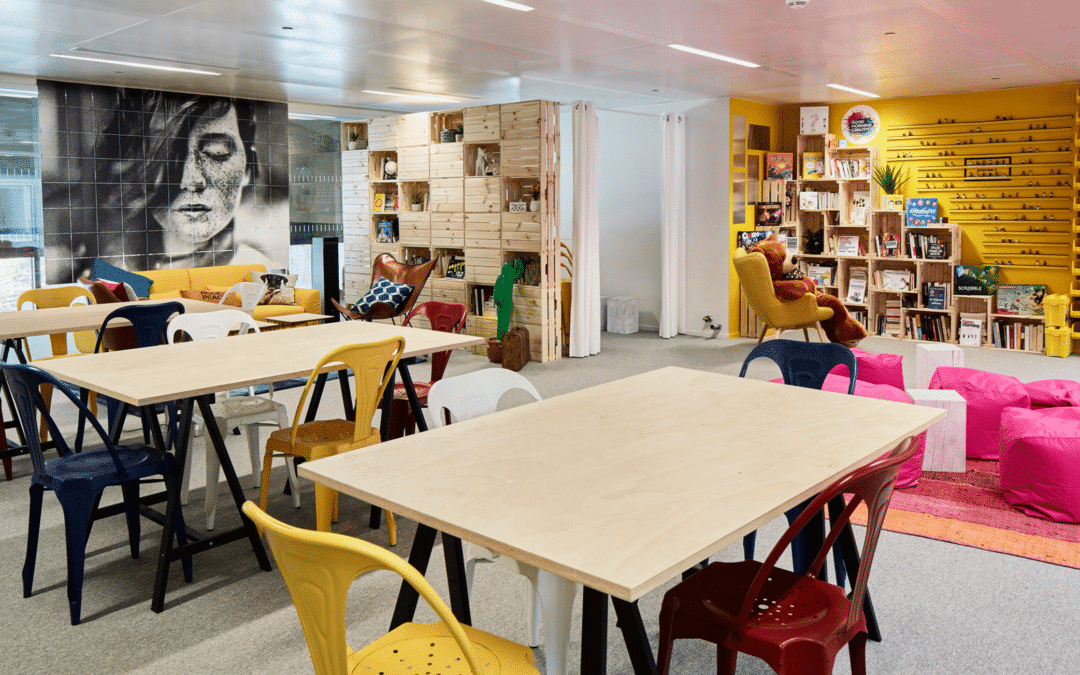In our Council and Executive Committee consultancy work, we are hearing more and more about ” employee centricity “, where until now the emphasis has been on ” customer centricity “. So what does this evolution reflect? Should we oppose these two notions? Can the experience of the historical subject accelerate the more recent one? Zoom in on a shift in focus, which translates into profound transformation issues for the organization.
Customer centric: a priority that has become mature
The notion of ” customer centricity“, which emerged in the 90s, took off a few years later, with the aim of putting the customer at the center of all organizational thinking and decisions.
We study his profile, we try to know him, to understand him, to understand his interests, what he feels, his “customer experience”. We can go as far as putting an empty chair in meetings to symbolize the presence of the client. What would he say if he attended this meeting? We imagine his journey in its different phases, from the beginning of the experience, and not only at the moment of the purchase. We move away from the idea of making more or less rational decisions, and build real relationships with our customers, offering them a quality customer experience.
This approach has generated many benefits for all those who have experienced it and, in fact, is not questioned at all. But in organizations, there is a theme that is “taking over” from ” customer centric “, namely ” employee centric“. It’s not a question of neglecting the customer, but of putting the employee “first” in terms of attention.
Developing Human Resources focused on employees means putting in place processes to attract the right candidates, support their professional development and retain them.
This is well illustrated by the title of the book “Employees first, customers second” by Vineet Nayar, CEO of an Indian multinational, the HCL IT group. Released in 2010, this bestseller marked the beginning of an awakening for many players interested in Human Resources, and more broadly in the transformation of their company.
The author describes his iconoclastic approach to turning the company around. His strategy: put employees first. He recommends putting employees at the center, focusing on what they experience, how they feel, and trying to make their “experience” as positive as possible.
Shift of focus: from customer to employee?
Organizations are faced with a changing, increasingly complex and uncertain world, in which responsiveness and continuous innovation are essential. However, faced with these new challenges, having sharpened or optimized processes is not enough. What makes the difference, what creates added value, is thecommitment of the employees. And this commitment leads to performance.
Since then, numerous studies have correlated engagement rates with performance increases or decreases, turnover and absenteeism, such as the 2022 Gallup report entitled ” State of the Global Workplace “, which estimates the cost to the global economy of disgruntled or disengaged staff at $7,800 billion.
Taking care of employees is all the more important in Human Resources Departments as they face the challenge of developing theiremployer brand and attractiveness. The development of Human Resources must therefore be done around the employee who will take his place and make his contribution in line with the relationship he expects to have with his employer.
The message “employee commitment makes the difference” will therefore gradually be translated into various HR actions: QWL, training in more caring management, communication, and even happiness at work… All HR processes are therefore impacted.
So how do you think “employee centric”?
Thinking ” employee centric ” means taking a similar approach to the ” customer centric ” approach. It’s a question of looking at the subject in terms of theemployee experience and the employee journey, and thinking about the employee’s impressions and pain points at every stage: before joining the company, with the image they have of it(employer brand), at the time of recruitment, onboarding, job changes, day-to-day relations with HR, training…
Then there’s their day-to-day experience: the value of their work, the trust and autonomy they’re given, their relationship with management, their sense of belonging, the harmony and dynamics of the team, their work environment, the possibility of reconciling their personal and professional lives… And finally, the way they’re retained, and even the way they’ll leave the company one day (offboarding), whatever the reason. He will be able to continue to spread a positive image of the company and recommend it to others.

To think ” employee centric “, we therefore need to consider each step individually (taking into account, of course, the company’s digital experience too, to achieve DEX D’Excellence, or Digital Employee Experience d’Excellence).
We can also add a global reflection for greater coherence: think about the company’s global people strategy, the main guidelines so that this employee experience is completely in line with the organization’s new strategic orientations, raison d’être and values.
The ” employee centric ” approach does not replace the ” customer centric ” approach, but rather shifts the organization’s focus and priority. And, above all, the former can benefit from extensive feedback from the latter, thus helping to accelerate the process.
Human resources are becoming increasingly involved in this strategic mission.
They are becoming essential partners in the development of employee commitment, and in guaranteeing an ” employee-centric ” policy – a policy regularly measured by internal barometers, such as the ones we implement for many of our customers.
Today, the challenge for companies is to strike a balance between the digital transition of human resources, support for change and the employee experience.
If this topic echoes your current needs, SQORUS HR consultants are here to help!
What tools can you use to manage your HR strategy?
Optimize your HR strategy and discover the essential management tools you need to achieve your objectives. Don't miss this opportunity to successfully manage your HR projects.
See also our feature on "HR strategy management tools".
- What are the key issues facing HR departments today?
- Organization, talent management, recruitment: priority HR projects?
- Human resources management: what HR strategies for the future?
- Best practices to manage your HR strategy in an optimal way
- The different HR management tools to carry out your HR strategy
- HRIS software: the different areas of intervention for the HR function
- How to convince your management to invest in an HRIS tool?
- Is it necessary to be accompanied in the management of an HR strategy?
- What indicators should be defined to measure the performance of an HR strategy?
- HR strategy: how to achieve effective HR reporting?
- Who should drive HR projects in the company?
- Setting up a working group for an HR project: who should be involved?
Contact
A project? A request?A question?
Contact us today and find out how we can work together to make your company’s digital future a reality.













